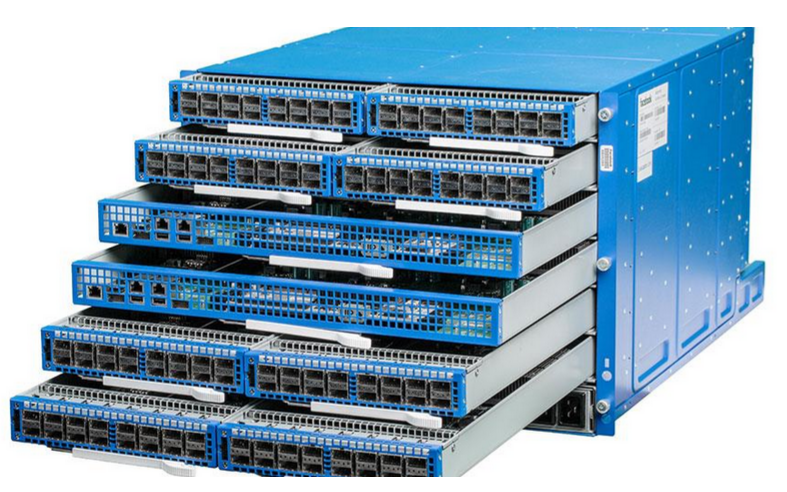 NEWS
NEWS
 NEWS
NEWS
 NEWS
NEWS
![]() Facebook announced at its Networking @Scale event today that it will contribute the design of a new modular, open source data center network switch, nicknamed “6-pack”, to the Open Compute Project (OCP). This will allow other companies to build and sell the 6-pack switch. Facebook describes the spec as “the first open hardware modular switch” and positions it as a replacement for popular high-capacity spine switches from Cisco Systems Inc., Juniper Networks, and other suppliers. Those products proprietary hardware and software and in many cases are not designed for software-led, or virtualized, network environments.
Facebook announced at its Networking @Scale event today that it will contribute the design of a new modular, open source data center network switch, nicknamed “6-pack”, to the Open Compute Project (OCP). This will allow other companies to build and sell the 6-pack switch. Facebook describes the spec as “the first open hardware modular switch” and positions it as a replacement for popular high-capacity spine switches from Cisco Systems Inc., Juniper Networks, and other suppliers. Those products proprietary hardware and software and in many cases are not designed for software-led, or virtualized, network environments.
The 6-pack was built as the final piece of an overall network environment that includes a top-of-rack network switch called “Wedge”, a Linux-based operating system for the switch called “FBOSS”, and a data center fabric designed to support faster, easier scaling, that Facebook designed for its own hyperscale data center, writes Facebook hardware Networking Engineer Yuval Bachar.
Facebook broke down the traditional network components and rebuilt them into modular, disaggregated systems to gain flexibility, efficiency and scale, he wrote. The Wedge design has also been contributed to the OCP.
The 6-pack is designed to be used with virtually any network management system, which means it can fit into a company’s existing environment, said Saugatuck Technology Analyst Alex Bakker.
Wikibon Principal Research Contributor Stuart Miniman noted, “Facebook’s OCP initiative (which spans multiple infrastructure areas) is very exciting but will take time to mature and be relevant for most enterprise users.”
Cisco CEO John Chambers responded to the announcement of what he called a “whitebox category” system by saying Cisco switches provide much higher security. This, he predicted, will be a deciding factor in customer purchase decisions. Cisco earlier today announced strong quarterly earnings, with revenues of $11.9 billion. Chambers was quoted in on Yahoo Finance as saying that Cisco’s competitors, in particular Facebook and VMware, are “all but crushed.”
The point of hyperscale, however, is that hardware devices like switches are commoditized with the management and security moved to a management layer that works across all the hardware in the software-led data center environment. This allows hardware, including switches, to be controlled from a “single pane of glass” in a central location and eliminates the need for constant manual configuring of data center hardware. The hyperscale data centers of cloud giants like Facebook already run this way.
“There are companies building robust and secure software that can enable the wave of open networking, and this is a serious long-term threat to Cisco’s current dominant position,” Miniman said.
One of those companies, Nicira, was purchased by VMware, a part of the EMC Federation, in 2012 for $1.05 billion in cash and approximately $210 million in equity. This technology became the basis for VMware’s NSX virtualized network software platform. This purchase has led to a growing rift between Cisco and EMC Corp., who are partners in VCE, the market leader in converged hardware systems. Last year Cisco cut its stake in VCE. In December it announced an agreement with IBM to build a high-end converged system combining Cisco’s UCS compute system with IBM’s Storewize V7000 virtualized storage systems. This system, called “VersaStack”, would compete directly with VCE’s converged systems.
Support our mission to keep content open and free by engaging with theCUBE community. Join theCUBE’s Alumni Trust Network, where technology leaders connect, share intelligence and create opportunities.
Founded by tech visionaries John Furrier and Dave Vellante, SiliconANGLE Media has built a dynamic ecosystem of industry-leading digital media brands that reach 15+ million elite tech professionals. Our new proprietary theCUBE AI Video Cloud is breaking ground in audience interaction, leveraging theCUBEai.com neural network to help technology companies make data-driven decisions and stay at the forefront of industry conversations.